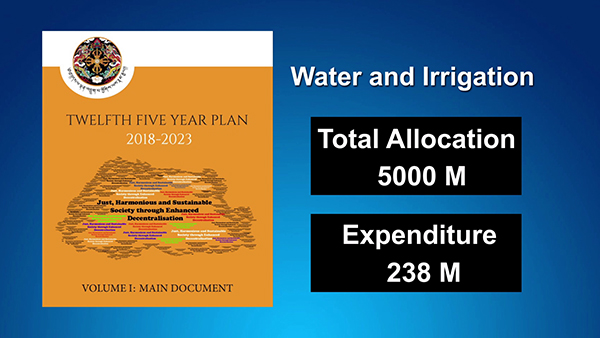 With the 12th Five Year Plan already midway, the government was able to utilise only more than Nu 2bn on the flagship programmes so far. A total budget of Nu 10bn was identified for these programmes. The flagship programmes were identified and prioritised based on the national significance and the potential for yielding high socio-economic impact.
With the 12th Five Year Plan already midway, the government was able to utilise only more than Nu 2bn on the flagship programmes so far. A total budget of Nu 10bn was identified for these programmes. The flagship programmes were identified and prioritised based on the national significance and the potential for yielding high socio-economic impact.
The drinking and irrigation water saw the highest budget of Nu 5bn. The expenditure so far remains at Nu 240 M. Under this programme, 130 rural water supply schemes and five urban water supply schemes have been completed. 180 rural water schemes and 18 urban schemes are still under construction.
The second highest budget was for the Digital Drukyul flagship programme with more than Nu 3bn. More than Nu 720 M has been spent so far. Under this project, the digital identity, digital school, electronic patient information system and government-initiated network among others are underway. Almost 530 agencies are today connected with optic fibre out of 1,085 agencies.
The government has allocated more than Nu 1bn for health. So far, more than Nu 100 M has been spent. The major programme under this is effective screening for cervical cancer, stomach cancer and breast cancer. In Bhutan, gastric cancer is the common medical condition in men and the second most common in women after cervical cancer. So far, almost 30,000 women have been screened for cervical cancer.
The other six flagship programmes include waste and stray dog management, promoting Start-up and CSI, National Day Footprint, tourism, education and increasing organic production. Altogether more than Nu 5.4bn has been allocated for these six programmes of which only Nu 1.6bn has been spent so far.
Without much progress in the implementation of the programmes, the last mid-term review reduced the budget of the flagship programmes to Nu 10bn from the initial Nu 15bn.
According to a written statement from the Prime Minister’s Office, the activities planned in COVID high-risk districts are being impacted and lagging behind due to the restrictions imposed including the mandatory quarantine requirements. The flagship programmes which require procurement of equipment have also been impacted by COVID-19.
Samten Dolkar
Edited by Sonam






